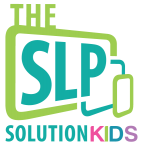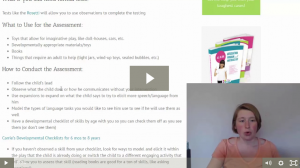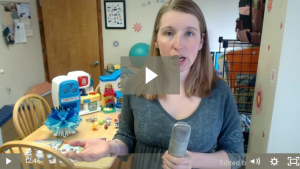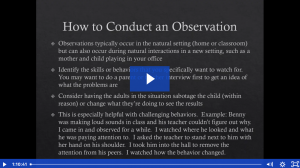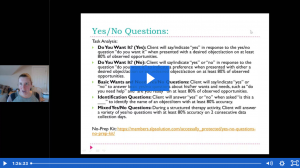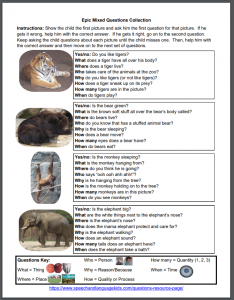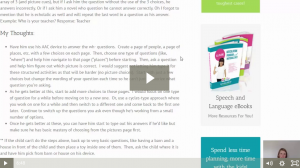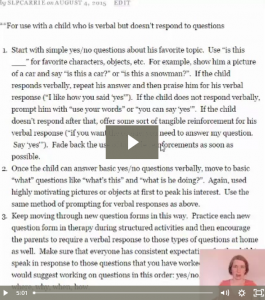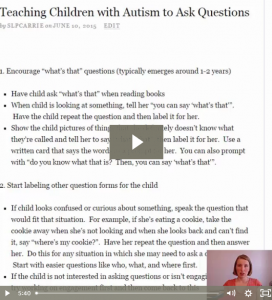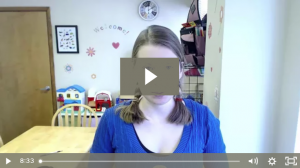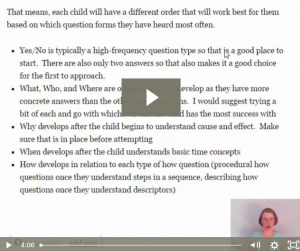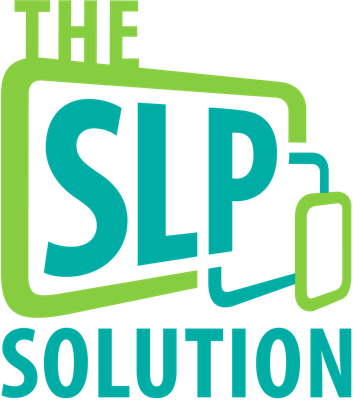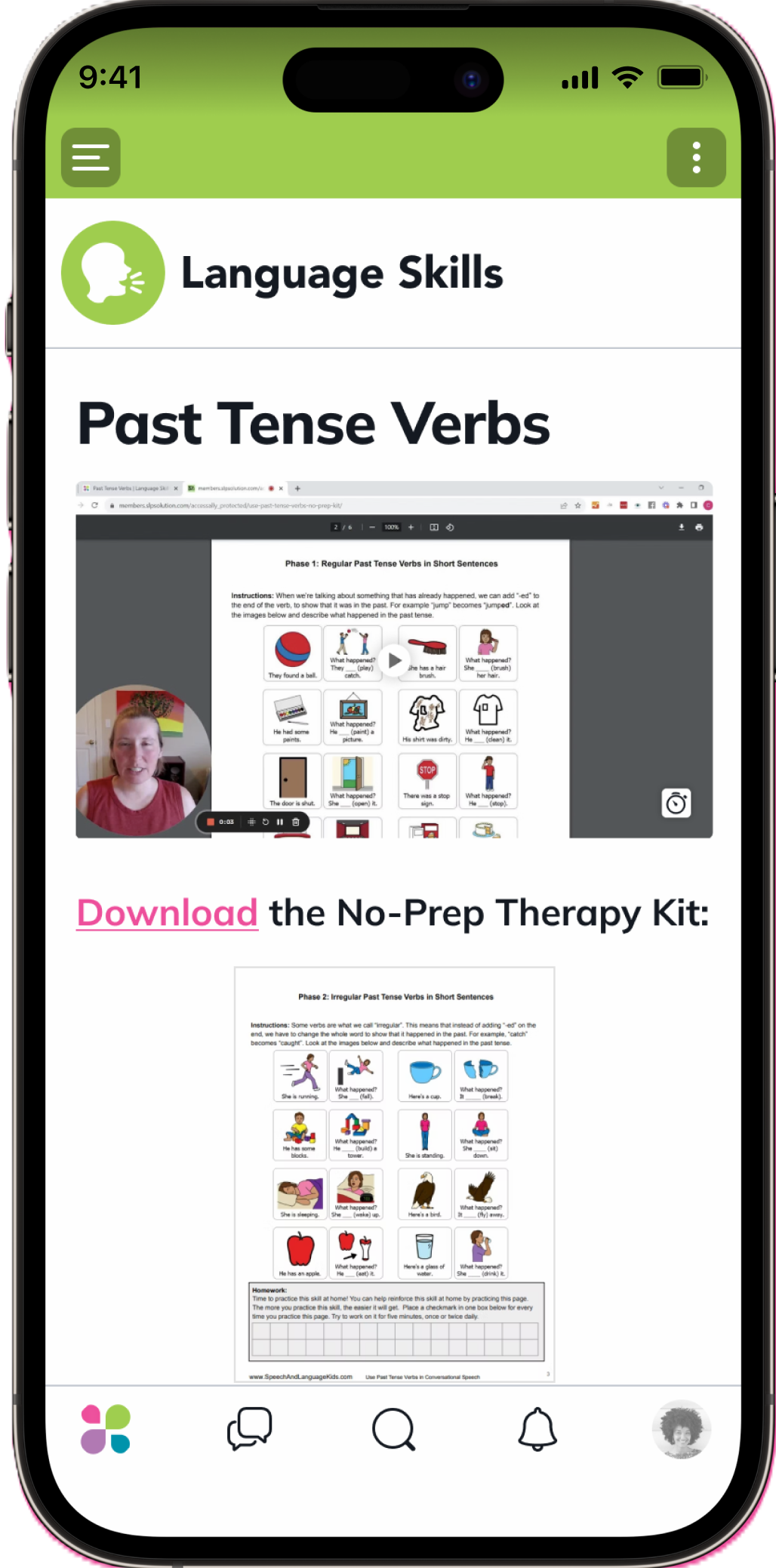Condition: Difficulty Asking/Answering Questions
Definition:
Children with language disorders and delays often have difficulty asking and answering questions. There are a lot of different cognitive processes that go into asking and answering questions.
Here is a list of all of the skills involved in answering a question:
- Auditory processing to hear the sound and convert it into a meaningful auditory signal. Children with hearing loss or auditory processing disorders may have trouble with this step.
OR
Visual Processing is required if the question is written. The child must be able to see the words and translate those into meaningful symbols. Children with visual problems may struggle with this step. Children with reading problems, such as decoding unfamiliar words, may have trouble with this step as well. - Attention and Engagement are required for the child to understand that the a question has been asked and that he should continue with processing and responding. Children with engagement issues, such as those with autism, may struggle with this step.
- Receptive Language to understand the words in the question and the meaning of the question as a whole. In particular, it’s important that they understand the meaning of the particular question word (such as who, what, where, etc.) as these all sound quite similar to a child who is first learning language. Children with receptive language or vocabulary problems may struggle with this step.
- Working memory for the child to remember the question that has just been given long enough to answer it. Children with memory problems may struggle with this step.
- Expressive Language is necessary for the child to be able to come up with an appropriate answer to the question and use language to formulate the answer. Children with expressive language delays or disorders may struggle here.
- Speech or Motor Planning is the last step which requires the child to motor plan how the answer will be relayed. This may be using speech sounds, motor plans to activate an AAC device, or motor plans to write the answer down. Children with speech impairments, motor impairments, or writing impairments may struggle on this final step.
Developmental Norms:
Here are some basic developmental norms for when children should be able to ask and answer different types of questions:
1-2 Years:
Answering Questions:
- Looks in the appropriate place when asked a simple question, such as “Where is Daddy?”
- Chooses an object with intentionality when asked about a choice of two, such as “Do you want milk or juice?”
- Answers “where” questions, such as “Where’s the ball?” by pointing to the pictured item in a book
- Answers “What’s this?” questions about familiar objects or pictures such as cookie or baby
- Answers “yes/no” questions, possibly with a head nod or shake
Asking Questions:
- Starts to use question forms, beginning with “What’s that?”
- Uses rising intonation
Answering Questions:
- Points to objects when described, such as “What do you wear on your head?”
- Answers simple wh- questions logically
- Answers critical thinking questions, such as “What do you do when you are cold?”
- Answers questions such as “Where…?,” “What’s that?,” “What’s … doing?,” “Who is…?”
- Answers or understands “Can you…?” questions
- Asks simple ego-centric questions, such as “Where cookie?”
- Asks “Where…?,” “What…?,” “What…doing?” questions
Answering Questions:
- Answers more complex questions logically, such as “who,” “why,” “where,”and “how”
- Answers “If…what?” questions, such as “If it starts raining, what would you do?”
- Answers questions about functions of objects, such as “What are spoons for?,” “Why do we have shoes?”
- Asks one-word “why” questions
- Uses “what,” “where,” “when,” “how,” and “whose” when asking questions
- Asks “is” questions
- Inverts auxiliary and subject in wh- questions, such as “Where is dad going?”
4-5 Years
Answering Questions:
- Answers “when” questions
- Answers “how many” questions (in which the answer does not exceed four)
- Asks the following types of questions using correct grammatical structure:
- Early Infinitive: “Do you want to…?”
- Future: “Are we going to …?”
- Modal can/may: “Can you…?”
Once a child becomes school age, question asking and answering skills become more focused around academic skills. Can they read book and then answer questions about it? Can they answer questions about things that happened in their day? Can they ask appropriate questions during classroom discussion? These types of skills are dictated more by grade-level expectations for children.
Evaluation:
Evaluating the ability to ask and answer questions should be included with your comprehensive speech-language evaluation. As mentioned before, you will need to evaluate all of the following types of skills to determine what part of “questions” the child is struggling with:
- Auditory processing to hear the sound and convert it into a meaningful auditory signal. Children with hearing loss or auditory processing disorders may have trouble with this step.
OR
Visual Processing is required if the question is written. The child must be able to see the words and translate those into meaningful symbols. Children with visual problems may struggle with this step. Children with reading problems, such as decoding unfamiliar words, may have trouble with this step as well. - Attention and Engagement are required for the child to understand that the a question has been asked and that he should continue with processing and responding. Children with engagement issues, such as those with autism, may struggle with this step.
- Receptive Language to understand the words in the question and the meaning of the question as a whole. In particular, it’s important that they understand the meaning of the particular question word (such as who, what, where, etc.) as these all sound quite similar to a child who is first learning language. Children with receptive language or vocabulary problems may struggle with this step.
- Working memory for the child to remember the question that has just been given long enough to answer it. Children with memory problems may struggle with this step.
- Expressive Language is necessary for the child to be able to come up with an appropriate answer to the question and use language to formulate the answer. Children with expressive language delays or disorders may struggle here.
- Speech or Motor Planning is the last step which requires the child to motor plan how the answer will be relayed. This may be using speech sounds, motor plans to activate an AAC device, or motor plans to write the answer down. Children with speech impairments, motor impairments, or writing impairments may struggle on this final step.
Sometimes it can be tough to really get a feel for how well they understand the “wh-” question words. If you’re struggling with that, try this one quick exercise. Ask a series of questions where they only thing different is the “wh-” word (or as close to it as you can get) and see what answers you get. Here’s an example:
- What do you eat for breakfast?
- Who do you eat breakfast with?
- Where do you eat breakfast?
- When do you eat breakfast?
- How do you eat breakfast?
- Why do you eat breakfast?
Check out our other evaluation resources here:
Have a child who can’t sit down for standardized assessments? Find out here how to conduct a play-based assessment instead.
How to Collect a Language Sample
A language sample can be a great part of a full evaluation. Learn how I collect a language sample here.
Suggested Goals and Materials:
There are many different types of “questions” goals that can be written for children, depending on the stage of development they are in.
Here are some goals that may be helpful for children who are struggling with questions. You can click on one of the goals below to learn more. Or, scroll down to the therapy section for more in-depth resources and support for treating this condition.
Click on any goals that are linked up to see any materials and no-prep kits for that skill.
- Answer Yes/No Questions (Open the No-Prep Kit)
- Answer What Questions (Open the No-Prep Kit)
- Answer Who Questions (Open the No-Prep Kit)
- Answer Where Questions (Open the No-Prep Kit)
- Answer When Questions (Open the No-Prep Kit)
- Answer Why Questions (Open the No-Prep Kit)
- Answer How Questions (Open the No-Prep Kit)
- Answer Questions about the Past (Open the No-Prep Kit)
- Answering Mixed Questions (Open the No-Prep Kit)
Therapy:
Here are some more resources and information that may help you when it comes to treating this condition.
